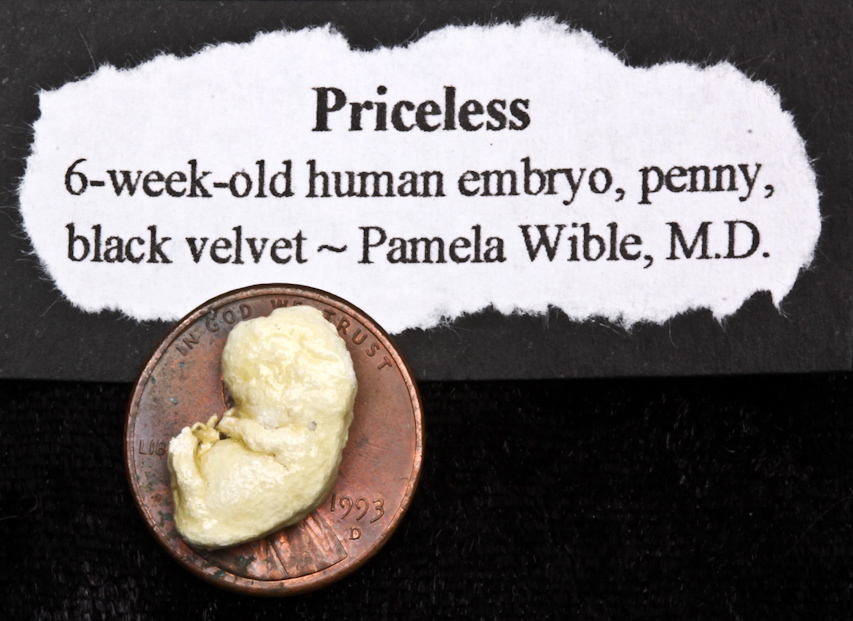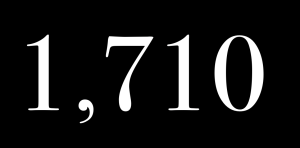Last week a woman told me that she had a miscarriage in her bathroom. She was terrified. She didn’t know what to do. So she flushed it down the toilet.
A miscarriage is the spontaneous expulsion of a fetus from the womb before it is able to survive on its own. One in five pregnancies ends in miscarriage. Many women don’t know they are miscarrying. Those who know usually suffer grief and sadness, mourning the loss of what could have been . . .
One moment a young mom-to-be is decorating the baby’s room, preparing to welcome a new son or daughter. The next moment, she is giving birth to death.
For some women every period is a failure. The disappointment, the longing, the despair is overwhelming. One woman describes “years and years of monthly miscarriages—a constant cycle of anticipation, devastation, acceptance, and surrender.”
How much is a human life worth? Women spend tens of thousands of dollars on fertility treatments that may still end in miscarriage.
What happens to all these miscarriages?
I asked Mom, a retired psychiatrist. She told me that during her pediatric rotation in medical school, she was called to a premature delivery. When she arrived, the obstetrician had already tossed the miscarriage in the trash. Mom looked down. The tiny body was still moving. Mom tried to save it, but it died.
It seems odd that someone so valuable could be flushed down the toilet or thrown in the trash. But not all miscarriages are discarded. Some are sent to my father.
As a teenager, I worked alongside Dad, a hospital pathologist. We received miscarriage specimens in plastic containers. Each miscarriage was carefully placed on a fine metal strainer in the sink. We turned on the water and rinsed away the membranes, clots, and blood until all that was left was a tiny little rib cage and a couple of femurs. Dad could date and age the little body by the size of the bones. I thought it was amazing.
While most fathers were accompanying their daughters to ballet recitals or soccer matches, I was privileged to participate in an archeological dig with Dad through the remnants of human life. And for me it was all normal—and beautiful.
Raised in a morgue, I spent my childhood accompanying Dad to work. I peeked in on autopsies and examined body parts. But as a young girl I was most intrigued by the babies. They looked like Buddhas. From largest to smallest, they sat cross-legged along one shelf. Floating in jars, they leaned toward me and stared straight through me. And they never blinked. They seemed to know something I didn’t. But who were they? And why were they trapped in jars? And how come I wasn’t inside a jar, too? Dad’s inner-city miscarriage collection still intrigues me. All Philadelphia natives, they were probably Irish Catholic, Puerto Rican, and mostly African American. But none were black, or brown, or white. All blue babies. All race-neutral. Chromosomal defects were the likely cause of demise. Maybe their tender souls weren’t ready for a rough, urban life. God may have had a better destiny for them.
This is the United States of America. In God we trust. So what happens to all these miscarriages? Seems the souls leave the bodies. And the bodies become medical waste.
But not all are lost and forgotten. When Dad retired, he offered me his miscarriage collection. I was honored to be asked to watch over their little bodies rather than have them incinerated as medical waste. But I could not see stuffing all the jars into my carry-on bag and holding up the line at the airport while trying to explain myself. So I kept only one. I made it through airport security with that tiny person in my pocket—a six-week-old calcified embryo about the size of a penny.
Sometimes when I lose sight of the big picture, I hold that tiny person in my hand and I see the whole world.
 Pamela L. Wible, M.D. is a family physician and bestselling author of Pet Goats & Pap Smears: 101 Medical Adventures to Open Your Heart & Mind. A portion of this essay excerpted from chapter 95, “Buddha Babies.”
Pamela L. Wible, M.D. is a family physician and bestselling author of Pet Goats & Pap Smears: 101 Medical Adventures to Open Your Heart & Mind. A portion of this essay excerpted from chapter 95, “Buddha Babies.”













I am one of seven children, 6 brothers and really one of 15 insofar as my mom had 8 miscarriages. I often wonder if they were all girls. My mom had 1 miscarriage at home, but my mom described it as a blighted ovum, which she baptized in the sink and asked me to call–who I do not remember, but I remember the baptism and at that momment, I knew human life was always respected. My mom placed everything from the sink in a jar, and told me the doctors would study the child to avoid someone else from miscarrying, and then the remains would be buried in a Catholic cemetary. Another time after a miscarriage, I remember my mom coming home with a rag socklike doll for me she bought at the hospital gift shop, and I remember naming the doll Jennifer. Years later she told me she recalled that the child of the miscarriage for that incident had a heart beating and a limp body like the doll she bought for me. I applaud women today who name thier miscarried children and do not keep everything inside. My mom was so afraid to announce her pregnancies because she did not want to announce her miscarriages. Years later I would have friends who did not want me to know they had an abortion. My mom and millions of women like her, and those that abort, I think, although I am not a doctor, suffer post-partum depression and are not followed and treated. All this loss I think has burdened my mom greatly, even as she is in her 80’s today. Have courage my mother and sisters who have experienced miscarriage, name your child, and know I always pray for these little ones I learned to love, because of my mother’s loss, and that Divine Providence does weep with you and in the next life we may know why there was all this loss and pain, and who became better because of the fleeting earthly existance of your smallest children. Your love for the child is mutual and lives eternally.
Thank you for sharing your words of wisdom. Takes courage to delve into some of these still taboo topics. So much healing potential awaits those who do. Thank you. 🙂
Dear Dr. Wible,
I am a man and so have had only experienced miscarriage indirectly. Thank you for sharing your and your father’s story, and for your writing on this blog.
Sincerely,
Jonah Hershowitz
I wonder if a doctor has my baby son in a jar since 1987, after reading this.
Pamela, I love your writing. You take us places we may never have been or may never go. You help us see the world in a different and more complete way. Thank you for letting us see through your eyes.
My oldest son died 5 yrs ago. Just before he died he told his two sisters that his sister was coming to take him. My daughter’s were mystified at this because there was no other sister. They came to me and asked if their mother ever had a miscarriage. I recalled she did have a miscarriage when Jim was 3 and Aimee was 2 yrs of age. Susan was born 2 years later. I don’t believe my daughters or son had knowledge of the miscarriage. Just before my son died he said she is here then passed. I share this with you to raise the possibility that something wonderful may be in store for those miscarried babies. Best regards, Gordon
Beyond beautiful Gordon. Thank you. And I agree.
Thank you!
Reading this again 9 years later and I love what you shared. I’ve been having mediumistic experiences–so comforting!
I had 4 miscarriages it was very sad for me, my daughter is 31 and my son is 23, they would of been older then my daughter, mine was the RH factor, after I had the shot I was okay! I think about the children I lost, still hurts! Sincerely Bonnie.
Oh, I am so sorry Bonnie. Hard to say goodbye to someone who never got to be born. (((HUGS)))